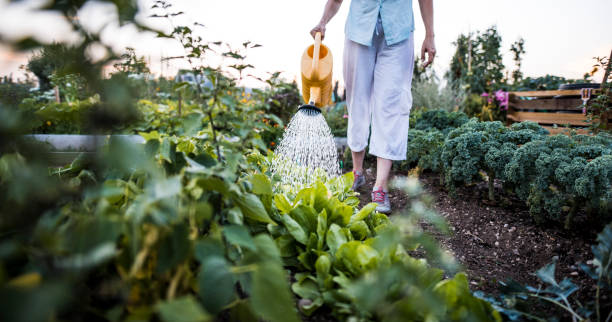Plants depend on water for many things, such as delivering essential nutrients and helping create energy through photosynthesis. If you want your garden to thrive, you’ll need to make sure it gets the right amount of water – not too much and not too little. In addition, it needs to be delivered so it reaches the roots and doesn’t just lay on the top of the soil or evaporate. The following tells you what you need to know about plant watering requirements:
When to water
Early morning is the best time to water your garden plants. Since the sun isn’t yet beating down on them, the plants’ roots will have time to soak up the water before it evaporates. If your schedule doesn’t allow you to water in the morning, take care of this task in the late afternoon or early evening.
Specific needs for different plants
Different types of garden plants react differently if they’re not watered enough:
- Shallow-rooted vegetable plants – Cabbage, lettuce, and spinach have shallow roots and depend on water to be able to properly expand their leaves. On the other hand, if they’re overwatered, their heads can burst.
- Broccoli and cauliflower – These vegetable plants rely on getting enough water during all stages of growth. A lack of water can lead to reduced growth and premature heading.
- Root, tuber, and bulb vegetables – Vegetables such as carrots, sweet potatoes, potatoes, and onions can have problems if they don’t get a consistent amount of water. Carrots can develop misshapen or split roots, potatoes can have second growth, and onions can bulb early.
- Fruiting vegetables – Cucumbers, melons, peppers, sweet corn, and other flowering vegetables depend on a good supply of water to let fruit go larger and avoid cracking and blossom rot.
Delivering the right amount of water in the right way
Gardens need about 2 inches of deep watering a week. If you don’t water this deep but instead do it more often, the water is more likely to evaporate, and root growth will be weaker. Sprinklers aren’t recommended for watering gardens, since too much water evaporates. Using a hand-held hose to do the watering takes a lot of time, so this is usually recommended only for small gardens. Soaker homes or drip irrigation are better options since they don’t soak leaves but instead deliver water that gets straight to the roots.
Signs your garden needs more water
The following are some signs to look for that indicate your garden plants aren’t getting enough water:
- Dry ground – Dig about 2 inches down into the soil to make sure it’s not dry.
- Improper growth – Plants may have stunted growth, small leaves, and produce fewer flowers than usual or even no flowers at all.
- Leaf problems – Leaves can become brown or develop a papery structure.
- Wilting – Wilting can mean your plant isn’t getting enough water, but since it can also mean your plant is getting too much water, you’ll need to check the soil to see if it’s very dry.
Signs of overwatering
Too much water is harmful to garden plants, so look for the following signs that you’re overdoing it:
- Slowed plant growth and yellowing leave
- Water-soaked spots on plant stems and leaves
- Rotting on the plant’s crown
- Soil that feels very wet a week after you’ve watered it
Have Questions About Your Plant Watering Requirements?
For more information about gardening, contact Mendham Garden Center in New Jersey. We’re a locally owned and operated business that has served the area’s gardening needs since 1960, and we’re happy to help you with the plants, products, and advice needed to produce a successful garden.

